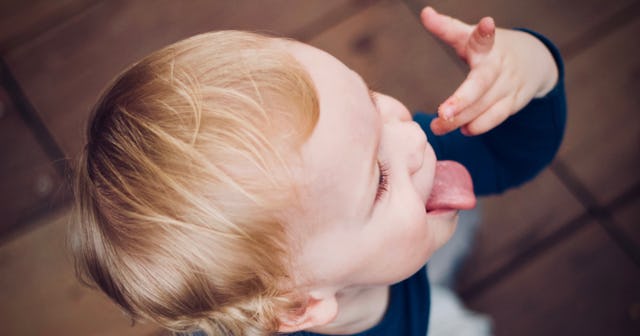Ouch! Here's What Causes Canker Sores In Babies And Tips To Sooth Those Mouth Ulcers

No parent likes to see their little one in pain. And it’s especially stressful figuring out why your toddler or baby is crying in the middle of the night. They can’t really talk yet, so here you are, Googling furiously at 3 a.m., playing a game of elimination with baby symptoms. Is it thrush? Is it teething? Is it a fever? Finally, you nail down the culprit: It’s a canker sore! Having a canker sore — also known as a mouth ulcer — is no fun for anyone, including babies. They must feel so betrayed when they get one. Here they are, relying on their mouths to eat, push out some teeth, and communicate (aka cry), and all of a sudden, something inside it hurts. A lot. Without being able to use their words to tell their adult person about the painful lump on the inside of their cheek, they have no choice but to cry until a grown-up does sufficient detective work to figure out that it’s a canker sore. Here’s what you need to know about what causes canker sores in babies, and some home remedies that could help sooth mouth ulcers in both babies and toddlers.
What causes canker sores in babies?
Canker sores, also known as mouth ulcers, are small sores inside the mouth, as well as inside the lips, on the back part of the roof of the mouth (soft palate), on the cheeks, or on the tongue. Though doctors still don’t know exactly what causes canker sores in babies and toddlers, according to experts at Cedars-Sinai, the following factors likely play a role:
- Weakened immune system
- Allergies to food, such as coffee, chocolate, cheese, nuts, and citrus fruits
- Stress
- Viruses and bacteria
- Mouth injury
- Poor nutrition
- Certain medicines
- Lacking in nutrients like B-12, zinc, folic acid, or iron
While we found no evidence directly linking teething to babies getting mouth ulcers, it’s not beyond the realm of possibility. We do know that canker sores can be caused by a cut or injury inside the mouth, and if a baby or toddler is teething, they could accidentally bite the inside of their cheek in the process. But the good news is that whatever you’re giving to help soothe them while they’re teething should help with the canker sores as well.
What are the symptoms of canker sores in babies and toddlers?
Apart from the sore itself, there may be other symptoms associated with mouth ulcers — although they affect every baby, toddler, and child differently. According to Cedars-Sinai these symptoms can include:
- Painful sores in the mouth, often inside the lips, on the cheeks, or on the tongue
- Sores that are white or gray with a red border
- Trouble eating or talking because of the sores
- No fever (in most cases)
In most cases, canker sores tend to heal in one to two weeks. Unfortunately, they also tend to come back.
How do you treat canker sores in babies and toddlers?
How you treat canker sores in babies, toddlers, and older kids depends on their age, symptoms, and overall health. First of all, it’s a good idea to contact your doctor if the baby’s canker sores:
- Are very painful
- Last more than a few weeks
- Are very large in size
- Keep coming back
In most situations, though, canker sores are something that can be treated at home. And while you can’t make your child’s canker sores magically disappear (no matter how much you want to), Cedars-Sinai suggests the following to soothe mouth ulcers in toddlers and babies:
- Drinking more fluids
- Taking acetaminophen for any fever or pain
- Getting proper oral hygiene
- Using medicines on the skin to help ease the pain of the sores
- Using mouth rinses to help with the pain
- Avoiding feeding them spicy, salty, or acidic foods that could irritate the sore.
There are also some home remedies for canker sores in toddlers, babies, and older kids out there involving different herbs, spices, and food substances, but there isn’t research to back them up. (Plus, with so many food allergies out there, it’s probably best to avoid these folk remedies.) Instead, stick with things that you know are safe for your baby or toddler to put in their mouths that help to reduce their pain — strategies like giving them popsicles (or other frozen treats) to soothe the sores inside their mouths, and keeping them hydrated are your best bet if you’re looking to avoid giving them medication.
*There are also a few natural remedies you can use to soothe and reduce your baby’s canker sore. Mix one teaspoon of baking soda or salt into half a cup of warm water. Then dab the solution on baby’s sore spot. You can also try rubbing milk of magnesia on the canker sore throughout the day to help get rid of it.
Are canker soars in babies contagious?
Canker sores aren’t like cold sores because they aren’t contagious or spread through kissing or saliva. A virus doesn’t cause them, so canker sores won’t spread, but they can pop up occasionally. With cold sores, your toddler may feel tingling on their lips, and those sores usually scab over and filled with fluid. Canker sores are always on the inside of your mouth.
Can teething cause sores in the mouth?
Teething is responsible for many changes to a baby’s body, like a spike in body temperature, waking up in the middle of the night, and frustration. However, it cannot cause sores in the mouth. Teething, however, can cause rashes around the child’s lips. Due to the excess saliva teething produces, babies basically soak their lip area, cheeks, neck, and chest with spit, which usually leads to dry and flaky rashes.
This article was originally published on